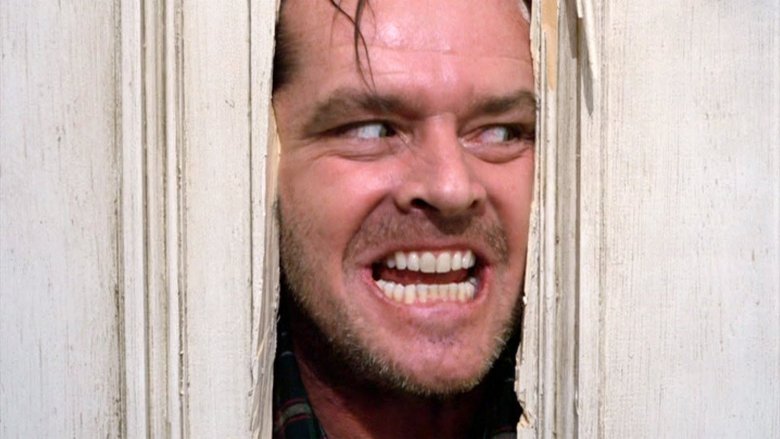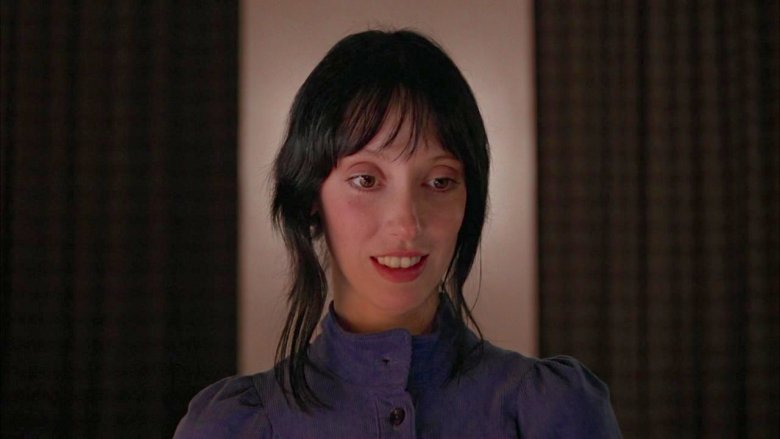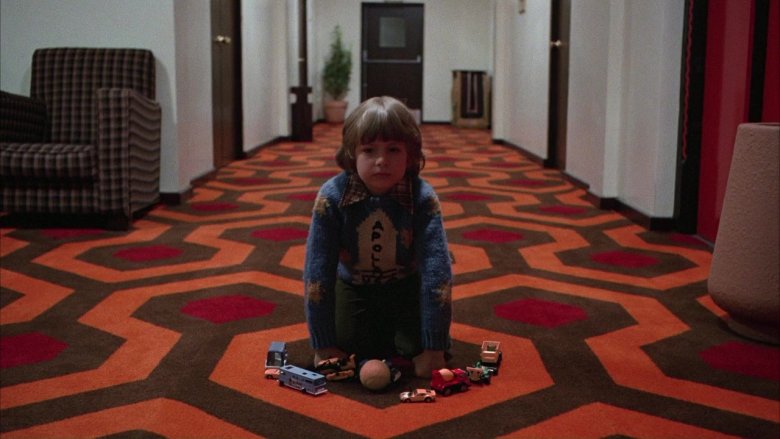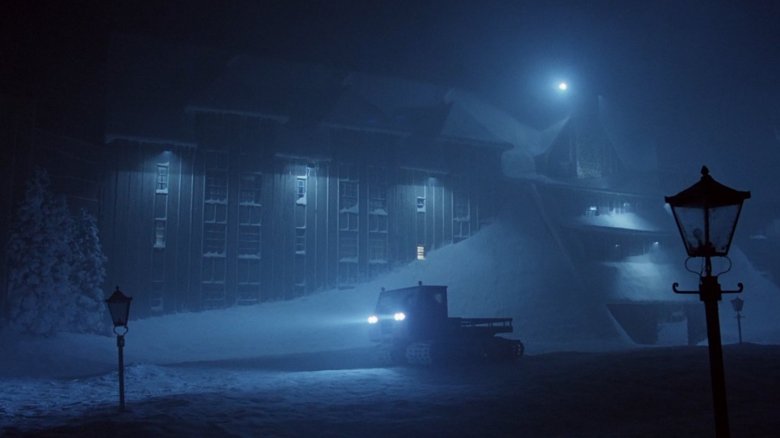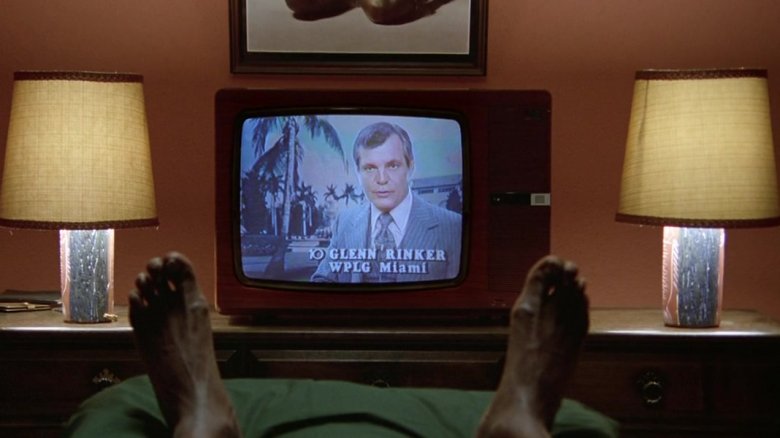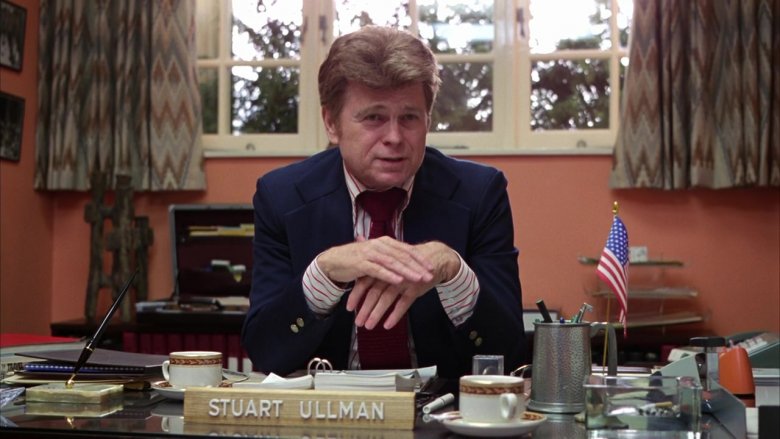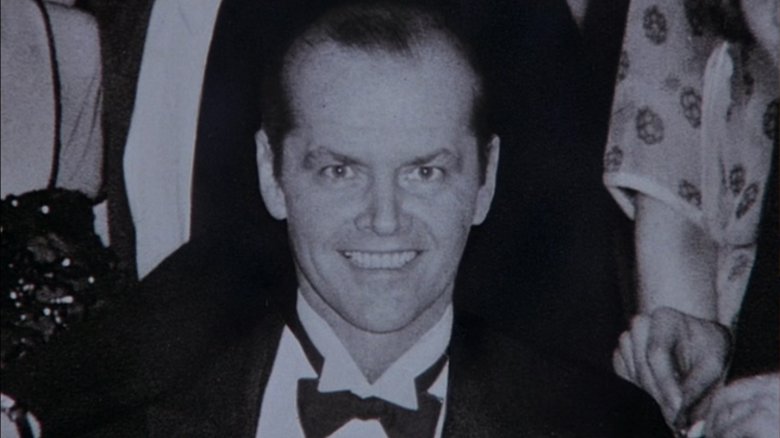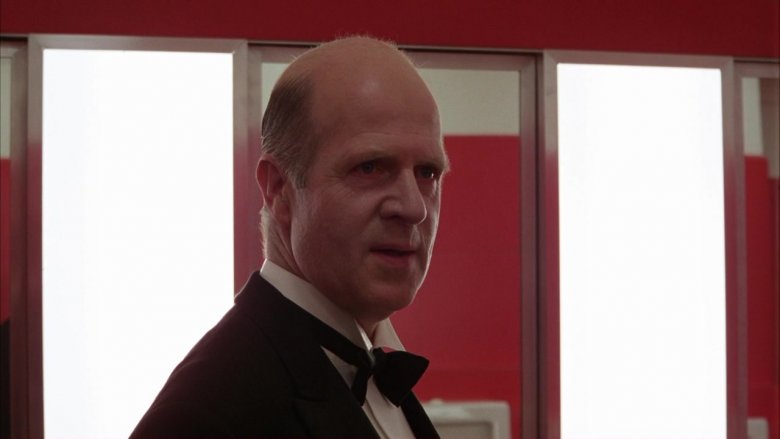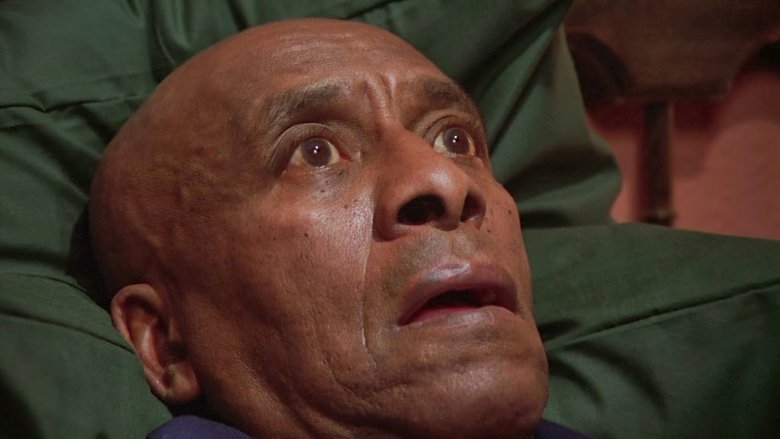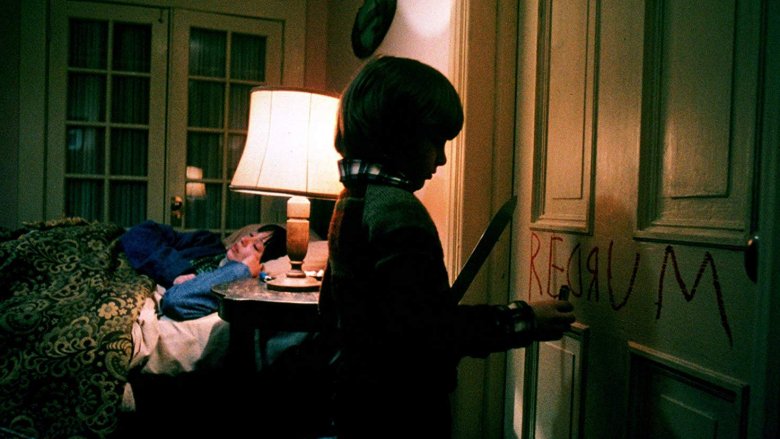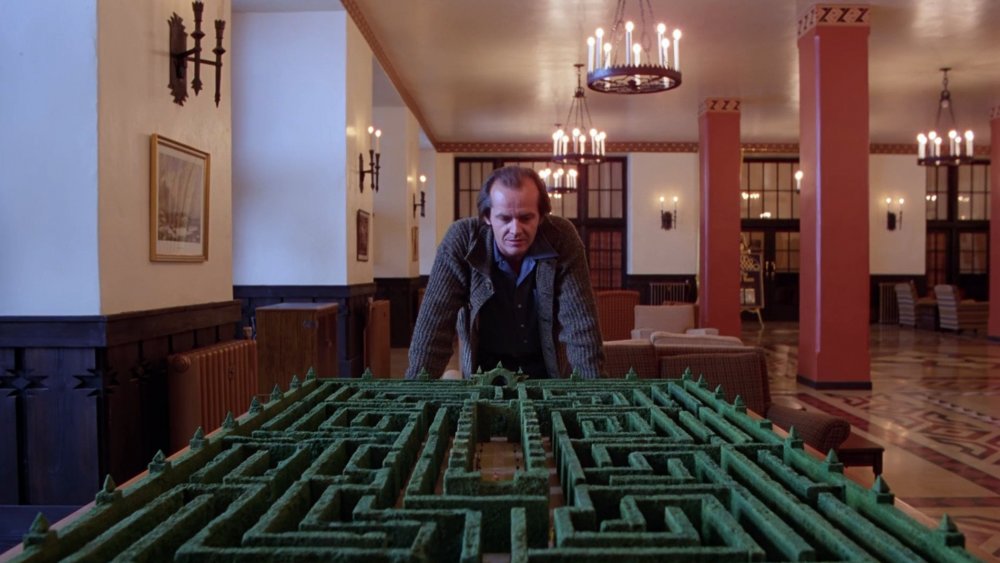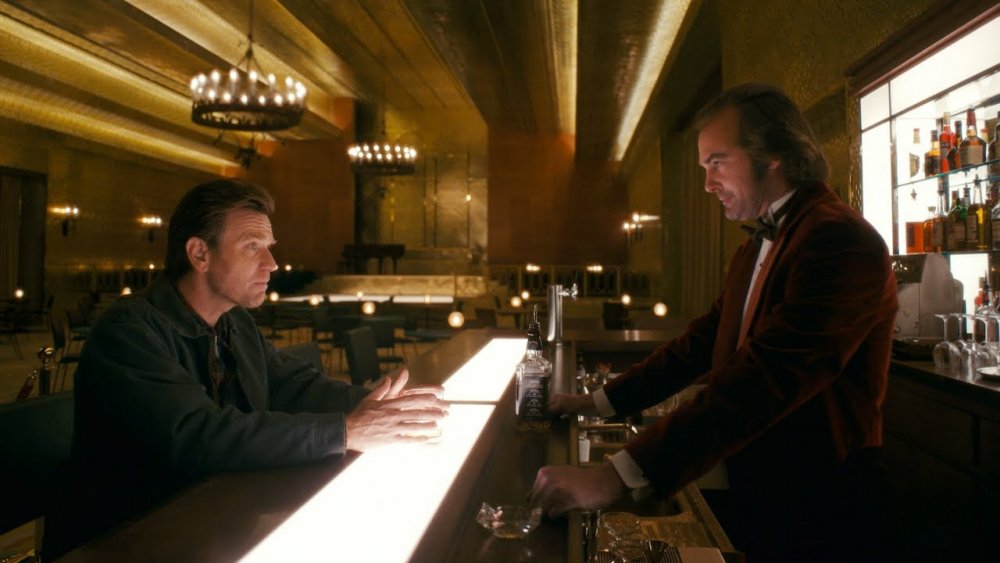The Ending Of The Shining Explained
For nearly 40 years now, The Shining has reigned as one of the most acclaimed and terrifying horror films ever made. Stanley Kubrick's adaptation of Stephen King's novel about a haunted hotel and a boy with a frightening power remains endlessly fascinating. So fascinating, in fact, that its obsessive fans and their continued analysis spawned an entirely separate film — the documentary Room 237 — that's just about picking apart its many details and apparent hidden meanings.
For many fans, though, it all comes down to that abrupt, ambiguous, and intriguing ending. What does that famous final shot really mean, and what do those unanswered questions in the film imply about the aftermath for the characters left alive? It's time to talk about those questions, and perhaps even arrive at some answers. This is the ending of The Shining explained... or, at least, as close to an explanation as we can get without making a documentary of our own.
Wendy's story
Though she may not always seem it at first glance because she spends much of the film in a state of dread or outright terror, Wendy Torrance (Shelley Duvall) is the heart of The Shining. As Jack (Jack Nicholson) begins his descent into madness, she's the one holding her family unit together, checking on the Overlook's heating systems and communicating with the forest service when the phone lines go down. Even as Jack ratchets up his emotional abuse, she still holds things together for the sake of her son. Wendy finally finds enough strength to survive Jack's physical attacks and escape with Danny (Danny Lloyd) in the snowcat at the end of the film.
We are given no clues as to what Danny and Wendy will do now that they're free of Jack's clutches, or even if they truly do make it safely to civilization after vanishing into the night. We have no way of knowing what direction Wendy's life will take from here, but Jack does indicate early in the film that she's a "confirmed ghost story and horror film addict." Now that Wendy has lived out her own horror film, perhaps she'd like to tell that story publicly?
Danny's uncertain future
In Danny's case, the future is perhaps even more murky, because he's just a boy unprepared to decide his own destiny. Having to trap his own father in a freezing hedge maze to escape murder, and then flee a haunted hotel where he'd just seen so many terrible things, is obviously going to have a massive impact on him. If you want to go with Stephen King's version of events, Danny's future is at least partially written. He suffers from alcoholism, like his father, and ultimately gets a job at a hospital where he's able to help guide the dying into the next realm. He once again encounters someone who can shine, this time a young girl, and fights to save her from a group of psychic vampires who roam the United States.
This is all covered in King's novel Doctor Sleep, the official sequel to The Shining (which will be getting a film of its own in 2020). Kubrick's adaptation of the original story makes some drastic changes, leaving the movie's Danny not necessarily bound to the same fate. Still, even if he never finds anyone else who can shine, he'll definitely be searching for the rest of his life.
An improved caretaker system
In King's novel, the Overlook's boiler explodes at the end of the story because Jack failed to maintain it, which means the hotel is destroyed with him inside. That doesn't happen in Kubrick's film. The Overlook is still very much intact, and grisly murder aside, its owners will likely want to keep it in business after they manage to thaw Jack's body and clean up the mess he left. This leaves the question of what to do about the caretaker job, now that two of the men who've held the position have lost their minds and murdered people in the span of just a decade.
Someone has to stay and look after the place, of course, but maybe Ullman (Barry Nelson) would be open to some kind of alternative caretaker system. Perhaps the hotel will invest in more snowcats and have people trade off the job throughout the off-season. Perhaps a team of people will take the job rather than one man and whatever family he cares to bring with him. Perhaps the Forest Service could be persuaded to make regular checks. Whatever the case, the hotel's management has to enact some kind of change now that a pattern is emerging.
A curious media
One reason the Overlook's management will likely have to make changes is the shifting media landscape in 1980, the in which the film was released and (presumably) is set. Television and radio reports are present throughout the film as the characters tune in for news of the outside world. When Wendy and Danny arrive down in Sidewinder, they are very likely to tell their story in a way that some savvy journalist or other will latch on to it.
We don't know if Wendy would dare tell the story's more supernatural details to the press, but anyone who simply investigates Jack Torrance's rampage will also likely dig up the Grady story from a decade earlier, and the Overlook will be the site of the kind of media frenzy that might make Ullman and his cohorts quite nervous indeed. There's no way of knowing how long or how intense the media blast would be, but it's hard to imagine Jack Torrance's crimes going ignored in the same year that CNN was launched.
Secretive management
There's another, more sinister aspect to the way the Overlook's staff may or may not react to what happened with the Torrance family over the winter, something Shining fans have long discussed. Though he seems reluctant to talk about the Grady incident at first, Ullman ultimately seems all too casual about when it is mentioned, and takes Jack at his word that he'll be fine. He later mentions the Indian burial ground upon which the hotel is built in a casual, almost showy way, while giving the tour.
There's something vaguely sinister built into every frame of The Shining. The film is designed to unsettle us constantly, and Ullman's appearances are no different. So, we are forced to ask the question: does Ullman know that his hotel is haunted? Does he know that the place needs to let its demons run free every once in a while, and that the caretaker will go crazy and murder his family? Is it a kind of blood sacrifice to appease the ancient evils that roam the place, so they can have a happy and prosperous business season each year? The Overlook's mythology is simply kept too vague for us to be sure, but it's very possible that Ullman isn't telling Jack everything he really knows about the place.
A meaningful image
The most debated element of The Shining's ending is the revelation in the final shot that Jack is present in a photo of the Overlook's Fourth of July party in 1921. This could mean a few things. It could mean that Jack has, after communing with the Overlook's many spirits, simply been absorbed in death into its history, and now walks the haunted world where all eras seem to be happening at once. It could also mean that Jack was fulfilling some kind of twisted destiny by being at the Overlook, and the hotel is reflecting that.
There's one particular interpretation accepted by most fans. Jack was trapped in a cycle of violence and death that dominates the Overlook and many of its guests and residents, and he was a reincarnated soul who was always meant to come back to the hotel. This is backed up by the conversation in the red bathroom, when Grady tells him he's "always been the caretaker," and it seems the most likely explanation. Caretaker murders, Indian burial grounds, and all the cycles and mirror images in the film suggest that the Overlook is a place where history repeats itself, and Jack was always meant to be a part of that.
Other hidden faces
If you watch The Shining all the way through, get to that final shot of Jack in the photo, and then rewatch it, you will notice something that particularly stands out about the Overlook. There are framed black and white photos from throughout the hotel's history everywhere. They're on all the walls in the Colorado Lounge, including half-walls that form the base of staircases. Dozens of them, all in identical frames, all covering the hotel's illustrious history as Ullman explains that "all the best people" stayed there in its heyday.
If Jack was indeed a reincarnation of a past guest, and he was indeed always in the photo, how long will it be before someone — either accidentally or as part of their own research — notices him there? And if he's there, it stands to reason that Grady would be there too, proving he was also a victim of the cycle of reincarnation and violence. If the fallout from the latest Overlook tragedy goes on long enough, those photos will likely mean something to someone, and that will set off an entirely different kind of investigation.
"There are other folks"
When Dick Hallorann (Scatman Crothers) sits down with Danny to explain to him what "shining" is and how he knew so much about him, he tells the boy, "There are other folks, though often they don't know it or don't believe it." Danny is young and hasn't had a lot of experience in the world, but now that he's lived through the Overlook ordeal, he will almost certainly take Dick's words to heart as he goes about his daily life. He will be looking for others who can shine, whether consciously or not, and he will eventually try to find out how many of them have had similar experiences to his own.
Are people with this ability simply drawn to places with innate supernatural presences, or are they able to sense the spirits present wherever they are? The film only scratches the surface, but as Dick's time in the living world ends, Danny's is just beginning, and he's about to go on his own journey.
Breaking the cycle
The Shining is a film about cyclical violence, and about how we can't escape the dark specter of history. The Overlook is built on the sacred lands of Native Americans slaughtered by white expansion, and blood continues to spill there. Jack Torrance has always been the caretaker. His alcoholic tendencies come back to tempt him when he's in the Overlook's grip. Wendy sees Danny injured and immediately thinks it was Jack, because he's hurt their son before. Grady killed his family, and his daughters warn Danny of what's to come for him. Jack's eventual weapon of choice, like Grady's, is an ax.
And yet, by the end of the film, only Dick — who wasn't supposed to be there — and Jack himself are dead. Wendy and Danny escape relatively unscathed. Does this mean that, through their survival, they've somehow broken the cycle? Does this mean the Overlook's evil sway is at least somewhat lessened? It's not clear, but there is hope.
Are there hidden meanings in The Shining?
Over the years, The Shining has spawned some of the most elaborate and bizarre fan theories you'll ever hear about any film. An entire documentary, Room 237, rose out of this subset of Shining fan culture, and over the years, these theorists have posited any number of ideas about what the film "really" means. For some, it's a secret admission and apology for Kubrick's supposed faking of the moon landing in 1969. For others, it's the story of the mythical Minotaur. There are even some people who think the true meaning of the film is unlocked by watching it backwards.
Many of these theories rose out of Kubrick's famous filmmaking precision. These fans can't believe that a detail-oriented filmmaker like Kubrick would leave any single object or moment to chance, so it all had to be part of a larger meaning. But according to Kubrick's co-writer, Diane Johnson, that's really not the case.
"Very often, crew members asked him, 'Can you explain that to me?'" Johnson recalled to Entertainment Weekly."And he said, 'I never explain anything, I don't understand it myself. It's a ghost film!' You can't imagine how much fuss was made over the big golden ballroom and the big lobby and huge windows that could never have fit into the hotel [based on the] establishing shot from outside. Any child can see that. And Stanley's explanation was, 'It's a ghost film! Forget it!' ... It's not a movie with a serious message."
Of course, at the very end of the film, when Jack Torrance pops up in that old-timey photograph, his pose looks kinda familiar — you know, like the image of Baphomet, a deity long associated with the devil and Satanism. Does that mean Jack is burning in Hell for his sins? Maybe ... or maybe we're just reading too much into a super creepy photo.
Jack Torrance returns
In 2019, The Shining got a much-anticipated, big-screen sequel in the form of Mike Flanagan's Doctor Sleep. Though it was adapted from Stephen King's novel of the same name, Flanagan knew he had to pay tribute to the cinematic version of the Torrance family story, as well as the literary one. To do that, he reworked parts of King's novel so that the Overlook Hotel could still be standing, as it was in Kubrick's film world. This gave the now-adult Dan Torrance a chance to go back and to see what had become of his old man.
In Doctor Sleep, when Dan returns to an Overlook that was left to rot after his father went insane, he finds the old ghosts are still there and that his father is now among them. And when Dan sits down in the hotel's gold ballroom, he discovers that the bartender is now a version of his father, resentful and manipulative and full of malice as he tries to suck Dan back down into the self-destructive, alcoholic cycle that he himself fell victim to. Dan is ultimately able to resist his father, and by the end of the film, the hotel is destroyed for good. That doesn't mean the ghosts are gone, though, as the film also confirms that they can still find the people who visited them if given enough time.
